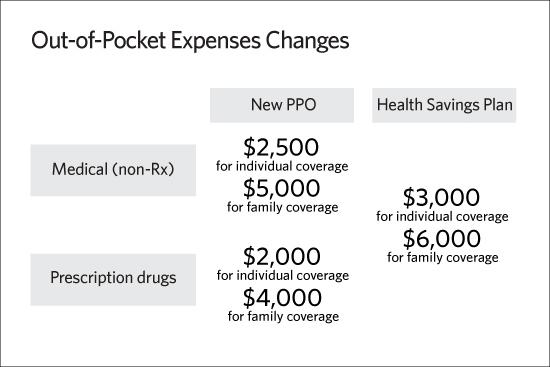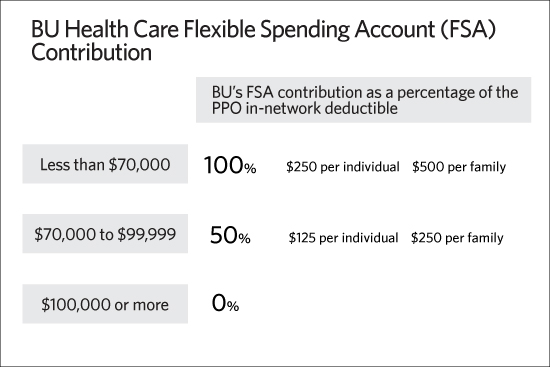Health Insurance and Disability Plans Will Have Changes
Open enrollment begins today

The University has responded to employee concerns and left scholarship eligibility under its Tuition Exchange Program unchanged next year. Photo by Cydney Scott
Open Enrollment, the time during which faculty and staff must choose from the University’s new menu of health insurance and other benefit plans, begins today, October 21, and runs to November 18. The changes go into effect next year, following the recommendations of a task force appointed by President Robert A. Brown.
The University will eliminate its health maintenance organization (HMO) health plan—one of three existing plans—and will create a new preferred provider organization (PPO) health plan that combines features from the HMO with those of an existing PPO. That change and several others, which reflect the community’s input to proposals of the Employee Benefit Task Force, will go into effect January 1, 2016.
The task force was charged with finding ways to ensure that BU offers benefits that continue to attract excellent faculty and staff, that it uses its financial resources prudently, and that plans comply with regulations. Its proposed changes were presented to the BU community, and more than 1,000 faculty and staff expressed their opinions at over 40 forums. The University also received more than 300 emails in response to the proposed changes.
Responding to overwhelming employee support for the existing Tuition Exchange Program, the University has chosen not to implement a proposal that would have used a combination of seniority and a lottery system as a requirement to receive the benefit. The program, which each year provides eligibility to 10 children of BU employees for scholarships to their choice of more than 600 participating universities, will continue to base that program’s scholarship eligibility on employee seniority only.
The University has also postponed, at least until January 1, 2017, proposed changes intended to bring its retirement plan into alignment with regulatory requirements, provide a more equitable distribution of the University’s retirement contributions, and encourage faculty and staff to save. The additional time will provide an opportunity to consider alternatives developed in response to employee comments.
Nimet Gundogan, Human Resources executive director of benefits, says other changes to the University-provided health insurance are also in direct response to the community’s concern about the proposed out-of-pocket maximum payments. Currently, BU offers three plans: an HMO, a PPO, and a Health Savings Plan. Starting January 1, the HMO will be eliminated, and some HMO features will be added to an updated PPO. The University will continue to offer its Health Savings Plan, which carries the least expensive premiums, but includes high deductibles and a tax-free health savings account.
In deference to employees’ comments, the University has resolved that both plans will retain the current out-of-pocket maximum expenses for medical care and drugs (see chart), rather than the higher maximum out-of-pocket expenses pondered by the task force.
To offset the cost of retaining the lower maximums, the new PPO deductible will be slightly more than the task force originally proposed. Employees whose care comes from providers in the PPO’s affiliated network will pay $250 if they’re on the individual plan, and $500 under the family plan.
To provide staff and faculty with an opportunity to hear more about the plans and ask questions, Human Resources will host a series of meetings at times and locations that can be found here. To learn more about 2016 medical plan options, employees should visit the Medical Plan website. A comparison of plan options can be found here. A complete guide to medical options can be found here. Employees can also contact Human Resources at HR@bu.edu, or by phone at 617-353 2380.
The University will contribute to eligible employees’ Flexible Spending Accounts if they enroll in the new PPO based on the higher deductible. The amount of the contribution will depend on an employee’s coverage level (individual or family), and is available to employees whose annual earnings are less than $100,000.
Finally, the health plans will not introduce coinsurance for emergency room visits, but instead will maintain the $100 copayment.
The University will also offer a new 457(b) deferred compensation plan, as of November 1, 2015, to eligible faculty and staff earning more than $180,000, rather than the $200,000 that was previously recommended, expanding the eligibility to more faculty and staff.
Brown appointed the task force as universities nationwide were undertaking benefits reviews, in part because of the so-called Cadillac tax that the Affordable Care Act will impose on more expensive health plans starting in 2018. BU’s current health plan would incur Cadillac taxes of about $2.8 million that year and approximately $31.6 million during the ensuing six years.
The task force pointed out that benefits are outstripping salaries in terms of the rate at which their cost is rising. Controlling those soaring costs is essential if universities are to meet public demands for controlling their overall price tag.


Comments & Discussion
Boston University moderates comments to facilitate an informed, substantive, civil conversation. Abusive, profane, self-promotional, misleading, incoherent or off-topic comments will be rejected. Moderators are staffed during regular business hours (EST) and can only accept comments written in English. Statistics or facts must include a citation or a link to the citation.